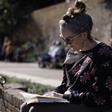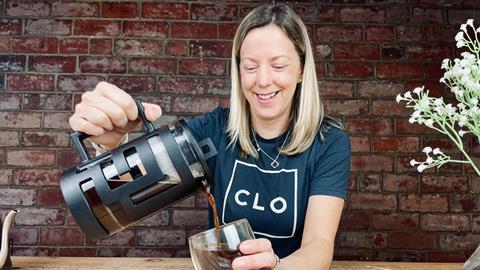Founder of CLO Coffee, Linda Castle, recounts the struggles to keep her socially conscious organisation alive amidst competition from larger chains
Linda Castle is head roaster and co-founder (with husband Nick) of CLO Coffee, a roastery and coffee wholesaler in Leeds. While they’ve adapted their business over the last few years, their vision for community remains unchanged and continues to drive everything they do.
Growing up, Linda found faith at the charismatic church she attended in Leeds: “as young as twelve, I was fairly sure,” she says. Feeling “really at home” in that environment cultivated her vision for community: “It had meant so much to me. I wanted to find a way of expressing that.”
The birth and expansion of an idea
While Linda had already thought she might like to run a café, career advice at school pushed her towards becoming a hairdresser: “I knew I wanted to have a job talking to people.” It’s been a useful skill to have, especially when it comes to cutting hair for their family of four kids.
Linda married Nick in 2006. After eight years of pursuing music, his band hadn’t landed a record deal but Nick still wanted to do his “own thing” and use his entrepreneurial skills. Casting around for the right idea: “[he] felt like God said, ‘You need to go and talk to Linda, because it’s together you’ll get something that excites you both.’” So, he asked her: “‘What would you do if you could run a business?’ I was like, ‘Café, I’d do a café!’” They’ve been in business together ever since, and their eldest children help out in-between school and college studies.
Linda and Nick opened their first café in 2008, and added five more sites over the next few years. By 2017 they were employing over 100 staff – including baristas, managers and even a sandwich maker: “the expansion was going really well”, she says. Initial costs for a new café relied on income generated by established ones. The surplus from their first ‘flagship’ café, in particular, could support the set-up and first year’s running costs until a café was financially self-sufficient. But then one café started “costing amounts that we’d not really taken into consideration”, and this coincided with some unexpected competition, which severely dented their profits: “the original [café] in our local high street had Wetherspoons open up next door, and Costa open up over the road, which we didn’t really factor into forward planning. Both of those took 35 per cent off our daily takings immediately as they opened.”
They closed five of their cafés, keeping only the first one running. Laying off staff was hard for everyone, but the response from their employees was surprising: “We got them all together to tell them, [and] they thanked us for everything we’ve done! That’s when you see [the power of a] team and people being with you.”
Pivoting the business
With those hard decisions made, they also had to rethink their business model. In 2014 they had installed a commercial roasting machine at their main site, which supplied coffee to all six cafés. They were already roasting and packing it under a separate company name, and in 2018 they started exploring wholesale supply in earnest. It was perfect timing, and enabled them to offer a home delivery service during the pandemic. Their next steps soon became clear: “Through praying, we felt that the legs were on the roasting business. It was giving us more contacts, and we felt there might be some wisdom we could bring.” They saw the opportunity to help with hospitality and facilitate community more widely, especially in churches.
By now, their remaining café was taking up significant amounts of time, and they felt it had run its course. They closed it in 2023, moving to new premises to fully focus on growing their wholesale business. “We are now in a warehouse with a bigger roasting machine, which is fun”, says Linda. She oversees the whole roasting process and enjoys the intricacies of operating a “massive machine”; maintaining it, cleaning it and working out the problems. “It’s brilliant”, she says: “you have different profiles for different coffees, [like] how long to roast it for, how hot and [how to] get the best flavours…I have to taste it a lot too.” She is supported by their small team: “We’re up to five now…we are roasting speciality coffee and packing it in various ways for churches, cafés, community centres and a couple of hotels.”
They source the majority of their speciality coffee from producers in Uganda who adhere to high standards, including sustainable farming practices (such as avoiding pesticides). This creates a far superior product to the commodity coffee often found in supermarkets: “speciality grade coffee is [an] international standard of coffee quality”, she says. These farmers can earn up to four times more than the ‘fair trade’ minimum: “because they’re putting in more effort”. Knowing where the coffee comes from is vital, so while sourcing Linda asks questions such as: “What are [the farmers] getting paid? How is it imported? Is that as low impact as possible? And does it taste great?”
Putting values before profit
For Linda, being a values-led, social business simply means, “trying to be like Jesus”. And this goes hand in hand with being transparent about their supply chain and the provenance of their coffee. She reflects: “We’re way more values-led than we are financially led, which can be our downfall. But they still feel this approach is essential: “There are choices all along the way…we could have bigger margins, [but] we want to have integrity about where we’re buying from.” They also consider their effect on the planet and ensure their packaging is eco-friendly. In both the small and big decisions: “we want people to be able to ask us questions and to feel like we’ve thought about why we’re doing it the way we are”. It’s an important component of their business, which they share with followers through their podcast and social media content.
We could have bigger margins, [but] we want to have integrity about where we’re buying from
They’re keen to champion greater diversity in the industry: “we’re really interested to try and buy coffees from places that are promoting women in the management roles”. In countries like Uganda, involving women at every level of coffee farming, not just in harvesting, minimises corruption and benefits whole communities. Closer to home, too, Linda observes that: “the professional coffee [world] is still really quite male”. When she started roasting in 2014, there was only a handful of female coffee roasters: “[At] my training it was all guys, [plus] me and one girl…there was definitely a real male-heavy environment there. And it goes all the way through.” Fortunately, that is now changing.
Taking time for connection
CLO Coffee now supplies coffee to “well over 150 churches” up and down the UK, and offers a range of packages and coffee solutions to suit different needs. People can even test these out at their ‘Brewtique’, which they take on the road and set up at summer festivals. They continue to diversify their business: “We’ve got a lot of flexibility around what we can offer.”
Looking back: “it’s all been a faith journey of massive highs and lows”. But despite some tough situations, Linda says: “it’s been a blessing to discover that God really is still there in those moments”.
So, what makes a good coffee? As well as the dedication that goes into making it, for Linda it forms an important ritual, a “sacred moment” that allows us time for ourselves, or to be with Jesus. It’s also a powerful “vehicle for community”, which not only draws people in, but enables us to connect with each other beyond having superficial conversations.
Visit clocoffee.com
Words by Alex Noel


































No comments yet